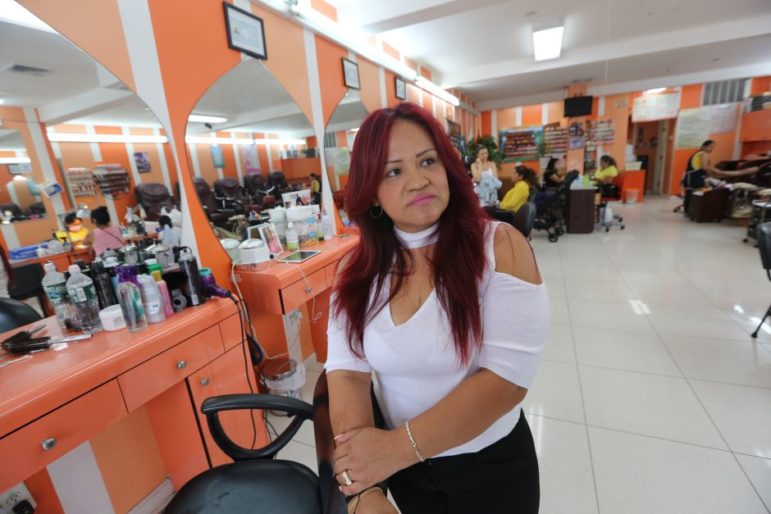
El Diario/Mariela Lombard
Lourdes Salazar, who witnessed the crime, believes it is time to create more awareness about domestic violence.
Read the original story in Spanish at El Diario
Translated and condensed by Carlos Rodríguez Martorell
The brutal murder last month of Dominican immigrant Carmen Iris Santiago, who was stabbed 20 times by her husband in a beauty salon on 37th Avenue in Queens where she worked, still generates anxiety and sadness in the New York neighborhood.
At the salon where the 35-year-old woman was murdered on Aug. 8, her co-workers still cannot erase the bloody act that took place in front of them from their memory. Still, the incident has turned into a powerful message to raise awareness among women about the need to report their aggressors, who may eventually become their killers.

Voices of New York spotlights ethnic and community reporting from around the city. Click here to read more.
“Unfortunately, sometimes we disregard some of the signs, such as obsessive men who send you messages while you are working, who follow you, who even come to your workplace to watch you,” said María Eugenia Hurtado, a Colombia native who worked at the salon for years alongside Santiago. “I think this will serve to create an alert in the community.”
In an effort to spread information about services and resources available to survivors of aggression and discourage this silence among the victims, the Mayor’s Office to End Domestic and Gender-Based Violence, in collaboration with a number of organizations, began carrying out outreach activities last month at nearly 50 beauty salons in Jackson Heights.
“Carmen’s murder was a terrible shock to our sense of humanity because, for many women, going to the hair and nails salon is like a therapy, a space of privacy,” said Assemblywoman Catalina Cruz. “The fact that something like this happened has hurt us deep in our soul. That is why we are out in the streets spreading information in an appropriate way about where help is available.”
Lourdes Salazar, an Ecuadoran woman who has lived in New York for 17 years and witnessed the vicious murder at the salon — where she and Santiago used to share anecdotes, customers and dreams — said hair salons can play an important role as a space for community awareness.
“It is crucial for us to have information about where we can recommend people to find help, to know what the procedures available are, where people who are feeling harassed may go. Obviously, we are not therapists, but it is comforting to know that there are resources to combat fear,” she said.
Salazar said that it is evident that macho culture is still prevalent within some Hispanic communities.
“We come from countries where laws against violent men are not as strong as those that exist here. Most women are terrified to report their aggressors. It is time to send that message and say that here we have the chance to stop aggressive men before it is too late, because they could be your murderer tomorrow,” she said.
Ésmelin Ramírez is a barber who, for years, has worked just a few blocks away from the salon where the atrocious crime took place.
“I do not think that all of us Latino men are sexist and violent. I think that those are very special cases of people whose mind must be controlled by the devil to go to the extremes of wanting to beat up or kill their partner. That is not normal,” he said.
Luz Caraballo, a Peruvian homemaker living in Astoria, said: “Often, we Hispanic women have very low self-esteem, and that allows many men to be violent with us. We need to learn that there are laws in this country. We need to be worried if our partner, whatever their sex, humiliates us in front of others. That in itself is violence.”
In 2018, the New York City Police Department (NYPD) responded to 250,447 domestic incident reports (DIRs), 111,330 of which were intimate partner-related, according to a report from the Mayor’s Office to End Domestic and Gender-Based Violence.
Legislator Cruz believes it is vital to inform immigrant communities that, regardless of their immigration status, there are alternatives available to them through the City’s Family Justice Centers, which connect residents to free and confidential assistance.
“Do not be afraid to report. It is possible that many women who have no papers choose to remain silent because their partner is also undocumented, and they tolerate the aggression for the sake of their children. They also fear deportation,” said the Colombian-born assembly member. “However, it is important for them to know about the resources available to them, from lawyers to emotional support counselors.”
Resources and support for victims of domestic and gender-based violence, including information on the city’s Family Justice Centers, can be found in the NYC HOPE Resource Directory. The city’s 24-hour Domestic Violence Hotline can be reached by calling 1-800-621-HOPE (4673). TTY: 1-800-810-7444








